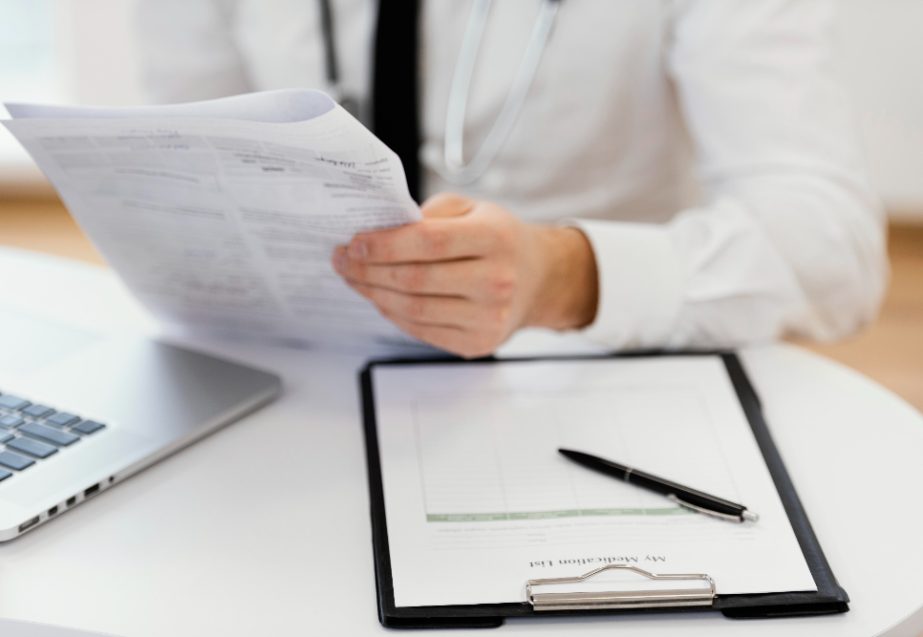
Collecting the right medical evidence for filing disability claim is very important if you are planning to file a disability claim in North Carolina.
The Social Security Administration (SSA) reported that from 2010 through 2019, the average final award rate for disabled worker applicants was 31%.
This statistic underscores the importance of comprehensive and timely medical documentation in claims.
In North Carolina, the Disability Determination Services (DDS) are responsible for obtaining medical evidence and making initial disability determinations. However, challenges exist in the timely collection of medical records.
For instance, a 2000 report highlighted that including North Carolina’s data, which recorded the payment date rather than the receipt date of medical evidence, led to inaccuracies in representing collection times.
This finding emphasizes the need for accurate and prompt medical record gathering to avoid delays in the claims process. Given these complexities, consulting with an experienced Social Security disability lawyer in North Carolina can be invaluable.
Hi In today’s blog, these are some of the things that I will be talking about. So, keep on reading this blog till the end to learn about how you can gather medical evidence for disability claims …
What is the Relevance of Medical Evidence for Disability Claim?
Medical documentation is the foundation of any disability claim. It supports the claimant’s assertion of adverse health conditions and how these conditions affect their life.
Benefits eligibility is determined by decision-makers who rely on this input as evidence. As a result, detailed and precise medical records become essential factors in establishing a strong claim.
In other words, medical evidence can help authority establish the servo or even the existence of truth in a disability claim. This is extremely important when law enforcement tries to corroborate the statement of the claimant in their disability claim.
And just so that it was not clear already, these pieces of evidence increase the credibility of the claim.
Here’s how medical evidence for disability claims helps the claimant:
- The severity of the impairment in the claim.
- Establishing impairment with the help of doctor’s reports and other medical records.
- Providing objective evidence and findings that support the claimant’s statements.
Medical Evidence for Disability Claim: How To Get Your Evidence
Now that you are aware of why medical evidence in disability claims is important and what purpose they really serve, let me tell you how to gather them in the right way.
So, here are some of the things that you need to keep in mind:
Documents Needed by the Medical Department
The first step in gathering evidence is identifying medical records. Vital records include medical history, treatment notes, diagnostic test outcomes, and doctor opinions.
None of these, when submitted as evidence, is irrelevant. Each piece plays a key part in conveying just how serious the condition is and how it prevents the claimant from being able to work.
Partnering with Healthcare Professionals
Secondly, choosing how to communicate with healthcare providers contributes to the success of a disability claim.
A reliable and supportive statement written by your doctors and specialists can come from a solid relationship you build with them.
Additionally, claimants should discuss their conditions openly and ask to be thoroughly evaluated. Working with medical providers ensures access to customized records that adhere to specific claims criteria.
Recording Symptoms and Limitations
Third, documenting symptoms and restrictions is the best way to prove the severity of a condition in terms of disability.
Claimants should keep a journal detailing their daily experiences with pain and fatigue and how they affect their ability to function.
Furthermore, this journal adds a more human context as an anecdotal piece to accompany the medical records.
Solicitation for Further Professional Perspectives
In some instances, it may be useful to obtain more expert opinions. Experts can shed more light on particular diseases, giving more substance to medical evidence.
Additionally, mandatory independent medical assessments can provide unbiased results. Quoting experts enhances the believability of the claim, giving it additional value.
Utilizing Objective Evidence
Objective evidence is data-based proof of a condition or its severity, such as laboratory test results, imaging studies, and clinical examinations.
It is important in the evaluation process because it serves as proof that the claimant suffers from impairments.
Moreover, the use of objective data adds to a case’s robustness and makes it a more compelling argument for decision-makers.
Avoiding Common Pitfalls
Some common missteps can derail a disability claim. Submitting improper/old medical records is one such mistake. In addition, inaccurate documentation confuses and wastes valuable time.
Additionally, claimants must not overstate symptoms, as doing so may raise red flags of inconsistency that will result in the denial of a claim.
Therefore, it is advisable to be honest and factual. That way, you can build trust and credibility from the start.
Writing an Effective Medical Summary
An organized medical summary is an account that groups together all the relevant information into a neat and readable story.
You should assist with writing this summary of important medical findings, descriptions of symptoms, and expert opinions.
With a clear and concise overview, decision-makers can better understand a claimant’s circumstances.
Besides, a well-written summary powers up the entire application and is more likely to be approved.
Keeping Up to Date with Policy Changes
Changes in the policies and criteria for evaluating disability claims must be noted for compliance. Tracking policy updates helps ensure that claimants do not fail to conform to current guidelines.
Applicants must keep themselves up to date by frequently checking official resources or talking with professionals. They can change how they gather evidence for a claim, keeping such policy changes in view.
Seeking Legal Assistance
Finally, without legal assistance, navigating these intricacies can be difficult. It might be tricky to bring your claim forward without guidance.
Disability lawyers can assist you with every step of the process. Additionally, they aid individuals in navigating legal stipulations, gathering viable proof, and preparing for an appeal.
This means that if claimants are eager to win their cases, consulting a lawyer is the best option, as the procedure can be quite confusing for a common man without the assistance of a lawyer.
Wrapping It Up!
In conclusion, collecting strong medical evidence is the foundation of a successful disability claim. Claimants can increase their chances of getting approved by recognizing how important medical documentation is.
Not many healthcare professionals will be willing and/or able to provide evaluations for each anticipated disability discussed within the context of a particular claimant’s specific claim. Hence, the use of objective evidence is necessary.
Read Also:
- Key Strategies To Minimize Legal Risks In Medical Billing
- How Medical Negligence Cases Have Evolved and How Lawyers Adapt











0 Reply
No comments yet.